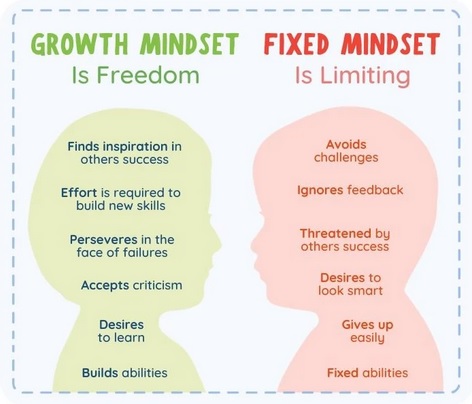8 Indispensable Strategies For Fostering Growth Mindset In Students To Achieve Success
29th May 2024
In an ever-changing environment, where flexibility is essential, it is more important than ever to help students develop a development mentality. A growth mindset is a potent idea that may help children become resilient, self-assured, and lifelong learners; it's not simply a catchphrase in the education field. Make sure you comprehend what a development mindset entails before deciding to adopt or cultivate one. Here is everything you need to know about having a positive mindset and a few tips to help students build this habit.
What Do You Understand By Growth Mindset?
A growth mindset, as defined by psychologist Carol Dweck, is the conviction that aptitude and intellect can be enhanced through work, education, and persistence. A growth mindset is based on the idea that aptitude and intellect are not fixed characteristics but rather may be improved through practice and experience.
This is in contrast to a fixed mindset, which holds that people's skills are inherent and unalterable. Adopting a growth mindset is a way of thinking that makes room for ongoing education, perseverance in the face of difficulty, and a drive for development.
What Is The Difference Between Growth Mindset And Fixed Mindset?
A fixed mentality, on the other hand, is the conviction that skills are intrinsic and unchangeable. Maintaining a growth mentality entails continuously evolving and improving as you hone your abilities.

Source: biglifejournal.com
This stands in stark contrast to a fixed attitude, which may lead you to believe that you are incapable of learning new abilities and capabilities. You can also think that you'll only be able to somewhat enhance your skills rather than greatly increase them if you have a fixed attitude. You may be unable to succeed at a job or school if you have a rigid mindset. Having a growth mentality makes it easier for you to concentrate on achieving your objectives.
Do you follow us on Social Media? If not, then you’re missing out on a lot of informative content. We regularly share upgraded educational content, tips, feedback, and more. Check us out by clicking the profiles here - Facebook / Twitter / LinkedIn / Pinterest / Instagram / YouTube
What Are The Key Characteristics Of A Growth Mindset?
Here are a few characteristics of why such a mindset can be crucial for students:
- Embrace Challenges
Pupils who possess a growth mindset perceive obstacles as chances for personal development. Rather than running from challenging assignments, they embrace them as opportunities to grow and learn. Resilience and the will to take on new challenges are fostered by this mindset, both within and outside of the classroom.
- Persistence
Students who have a growth mentality are more likely to overcome obstacles and setbacks. When faced with challenges, they don't give up; instead, they see these setbacks as transient obstacles on the road to progress. Students who possess this resilience will be better equipped to tackle challenges in both their personal and academic lives.
- Love For Learning
Students are more likely to like studying when they think that they can improve their skills with effort. They develop an authentic passion for learning as they grow inquisitive and receptive to new things.
- Improved Performance
Research has indicated that learners who adopt a growth attitude generally achieve academic success. They are more likely to ask for help when they need it, use productive study techniques, and eventually receive better marks.
How To Help Students Develop A Growth Mindset?
Here are a few strategies to develop a growth mindset in students and help them achieve academic success:
1. Embrace Imperfections
Imperfections are something you should help your students learn to accept and even celebrate rather than ignore. When they can accept their flaws, they may concentrate on figuring out how to accomplish their objectives despite these obstacles. Remember that achieving objectives may be simpler if you choose to accept imperfection than aiming for perfection.
2. Celebrate Efforts
Change the emphasis from only highlighting successes to recognizing and applauding the effort that students put into their work. Acknowledging the procedure strengthens the notion that diligence results in advancement.
3. Normalize Mistakes
Establish a culture in the classroom where making errors is accepted as a necessary part of learning. Talk about well-known failures and the lessons that may be drawn from them to show that obstacles are not barriers to achievement, but rather stepping stones.
4. Offer A Safe Space
Encourage pupils to take chances in their education without worrying about being judged. Students are more likely to adopt a growth attitude when they feel comfortable trying new things and making errors.
5. Encourage Reflection
Include introspection in the process of learning. Request that students consider their educational experience, noting obstacles they overcame, effective tactics, and growth opportunities. Setting goals and developing self-awareness are improved by this metacognitive method.
6. Teach Goal Setting
Assist pupils in establishing self-achievable, realistic goals. Divide more ambitious objectives into more doable, smaller steps. In addition to encouraging a growth mentality, this helps people acquire critical planning and organizing abilities.
7. Use Growth Oriented Language
Feedback should be framed in a way that encourages a development mentality. For instance, state, ‘I can see you've been practicing, and your hard work is paying off,’ rather than, ‘You're good at this.'
8. Model A Growth Mindset
As an educator, talk about your personal growth and learning experiences. Anecdotes from the author's own life that highlight overcoming obstacles and adopting a growth mindset assist students in realizing that progress is an ongoing process.
Help Students Overcome Real-Life Challenges
Developing a growth mindset is more important as education changes to suit the needs of the twenty-first century and sets pupils up for success in life. A growth mindset fosters traits like perseverance, curiosity, and a love of learning that go well beyond the classroom, in addition to academic success. As instructors, you should have an International Teaching Diploma course in Bangalore to be able to implement these practical strategies and create a culture that celebrates effort.
We believe education should be accessible for everyone. That’s why we don’t charge for our blogs. Find the right course that will help you in your career with us, contact us at - 1800–212–6400. You can mail us at act@asiancollegeofteachers.com.
Written By : Sanjana
Leave a Reply

